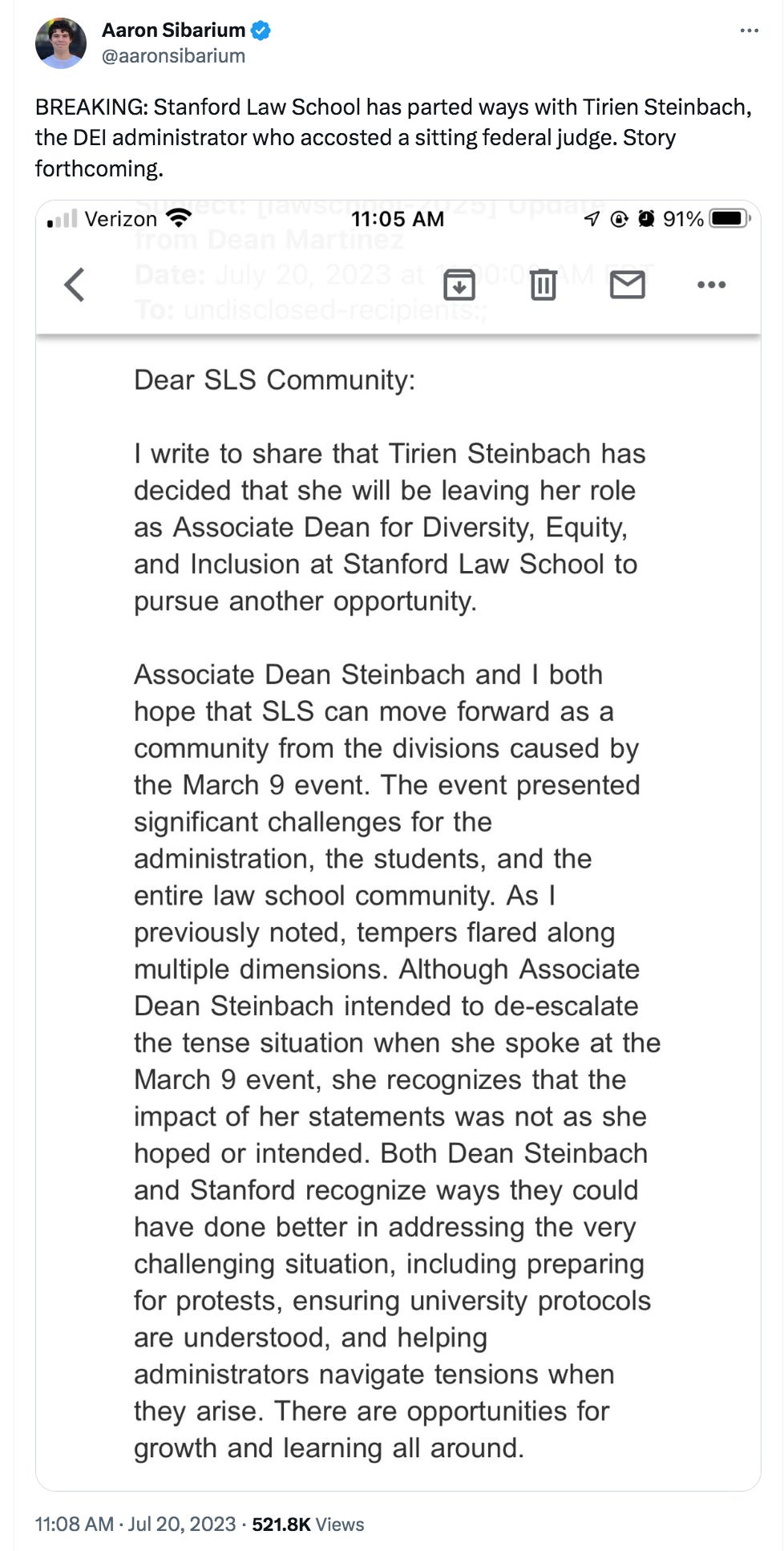E-Pluribus | July 21, 2023
This land is your land . . . for now; learning from failure; and can illiberal liberals become liberal again?
A round-up of the latest and best writing and musings on the rise of illiberalism in the public discourse:
Gabriella Hoffman and Sarah Montalbano: Power Grab at the Bureau of Land Management
Say “BLM” and most will think “Black Lives Matter”, but Gabriella Hoffman and Sarah Montalbano write at the Wall Street Journal about the other BLM’s plan to promote “conservation” of land by misusing a 1970s law. Hoffman and Montalbano say that under the guidance of Earth First alumni Tracy Stone-Manning, the Bureau of Land Management is exceeding its authority to push a radical environmental agenda.
The recently proposed Conservation and Landscape Health rule would establish “conservation” as a distinct use of land. But all uses of land entail conservation. The aim of the rule is to reduce sustained-yield land uses like grazing, mining and timber in favor of recreation spaces, watershed preservation, wildlife and fish protection, and “natural scenic, scientific, and historical values.”
[ . . . ]
The BLM’s program for conservation leases has other problems. The rule doesn’t specify which existing uses, including hunting and fishing, would be permitted on leased land. Moreover, the program would let the BLM decide on a case-by-case basis to let solar and wind companies offset the negative impact of their development on high-value habitats by committing to restore or enhance adjacent low-quality habitats to protect affected wildlife.
Imagine the uproar if oil and gas companies could buy forgiveness for their impacts on public lands by simply building bike lanes and reducing greenhouse-gas emissions in the town nearby their operations. Solar and wind companies’ adherence to the Biden administration’s utopian goal of net-zero through renewable projects will shield participating companies from any criticism over their ecological damage.
It’s unclear whether the BLM even has the authority to define specific uses for federal lands, let alone play policy maker based on those classifications. The responsibility to define and reshape FLPMA—and thus guide U.S. conservation policy—lies with Congress, not unaccountable executive branch agencies.
[. . .]
The newly proposed rule is redundant and possibly illegal, but it hardly comes as a surprise given the recent shift in the BLM’s politics. When President Biden entered office in 2021 his appointment of Tracy Stone-Manning to direct the BLM completely altered the bureau and its mission. Ms. Stone-Manning, whose involvement with the radical eco-terrorist organization Earth First! nearly derailed her confirmation, promised that she would make renewable-energy development a priority and adhere to Mr. Biden’s desire for a “carbon-free future on our public lands, across our country.”
Read it all.
Natasha Mott: The Case for Scientific Failure
The pressure today to readily accept the pronouncements of “experts” and scientists is rather strong, but writing for Discourse Magazine, Natasha Mott says that it’s important to recognize we can learn much when science is wrong. Mott cites philosopher Karl Popper and the legendary Albert Einstein to make the case that requiring science to withstand tough scrutiny, even from within, will leave us all better off.
[F]or science to progress, we must be cognizant of ever-growing market pressures, scientific careerism and our unquenchable thirst for certainty that we believe only science can satisfy. We need to reward careful science, over hasty claims. More specifically, the quality of science might dramatically improve if grants were awarded to scientists for attempts at falsifying old theories rather than the discovery of new ones; if we published and celebrated evidence against popular theories instead of perceived confirmations; and if tenure-track positions that are supposed to allow for bold conjecture and daring refutations were awarded to scientists who refute their own findings rather than those who bolster established dogmas. Perhaps if we popped bottles of champagne every time a theory is refuted, we might ultimately realize more scientific success and have fewer stories about academic fraud and how entire scientific fields were built on vapor.
[ . . . ]
Many of us have heard the argument that Einstein might not have fared well in today’s academic environment, which favors safe, assembly-line science and box-checking. Imagine, today, a 20-year-old kid out of college who can’t find a teaching job, submitting numerous papers to academic journals (as well as a whole doctoral dissertation) while working at a patent office without a university affiliation. An editor for today’s Annalen der Physik (which published the young Einstein in 1901) would toss the theory of special relativity out before it even made it to Reviewer Number 2. Can you imagine that same kid taking an unsalaried lectureship after submitting risky, but groundbreaking papers on special relativity, Brownian motion and the photoelectric effect? Einstein wasn’t even at the level of an adjunct, but he continued to try and refute his own theory, leading to the theory of general relativity. Today’s careerist tenure-track system might have had Einstein saving his most risky theories for much later, and possibly never seeing the light of day.
Einstein is lauded for his discoveries, but like many incredible scientists, people overlook the significant risk he took in not only exposing his theories to refutation but actively trying to blow them up. Another scientist interested in blowing things up, Alfred Nobel, the inventor of dynamite, established a prize for significant contributions to human knowledge in 1895. The recipients of this prize are considered heroes, but sadly, these heroes’ productivity declines after receiving this great honor. As you might guess, Popper wasn’t a fan of putting heroes on a pedestal, but he most admired iconoclast scientists like Einstein, Newton, Kepler and even pre-Socratic thinkers like Anaximenes and Thales, who Popper credits as willing to challenge their own theories as well as those of their heroes. Popper might have favored an anti-Nobel prize, for scientists who refute their most precious theories.
Read it all here.
Allan Stratton: The Left’s Social Contract Is Broken. Here’s How to Fix It
A failure to recognize progress can lead movements to distort and drift from their original principles and mission. Writing at Quillette, Allan Stratton says this is the case with today’s Left. The Left, he says, needs to abandon its victim and oppression narratives and work for a society that truly works for everyone.
The civil-rights movements of the last century won victories by liberal means based on liberal values. This included an insistence on free speech and civil liberties; and an appeal to the universal values of dignity and equality, which in turn underpin the case for protecting individual human rights and freedoms.
[ . . . ]
By contrast, today’s illiberal left explicitly rejects the principles of free speech and universality. It ignores the lessons of past civil-rights successes, often denying that such successes even took place. After all, how can one insist on the dismantling (or “decolonization”) of a system that has shown itself capable of self-correction and continuous improvement? The only framework that validates the progressive narrative of ongoing oppression and white supremacy is one that ahistorically presents mainstream liberal values as a failure.
The switch in social-justice circles from liberal to authoritarian ends and means has at least three major causes. The first is structural: As (originally) liberal rights groups such as the ACLU achieved their objectives, they were required to rewrite their mission statements and pretend away their past successes—this being the only way to justify their ongoing existence.
[ . . . ]
The second factor is generational change. Just as children separate from their parents in their passage to adulthood, so does each generation define itself in contradistinction to its immediate predecessor. Without personal memory of past struggles, present conditions are taken for granted. And so the battle against current injustices (real or otherwise) is seen as humanity’s defining and timeless struggle.
[ . . . ]
But perhaps the most significant factor has been the academic trend toward postmodernism, which instructs adherents that neither objective reality nor human nature exist in any certain, provable way. Reason, logic, and objective facts are rejected—or at least put in scare quotes—as are appeals to history and science. These are all held to be mere artifacts of language, which is itself presented as a reflection of existing power structures. And since these structures are presumed to systematically oppress the powerless, they must be deconstructed, dismantled, and decolonized, root and branch.
Read the whole thing.
Around Twitter
Radley Balko is discouraged by the state of First Amendment discourse (click for video):
Here’s Sarah McLaughlin of the Foundation for Individual Rights and Expression on the United Nations call to "prosecute acts and advocacy of religious hatred”":
And finally, Stanford DEI administrator “pursue[s] another opportunity”:











Thank you for including our WSJ column on BLM's new Conservation Landscape and Health rule!